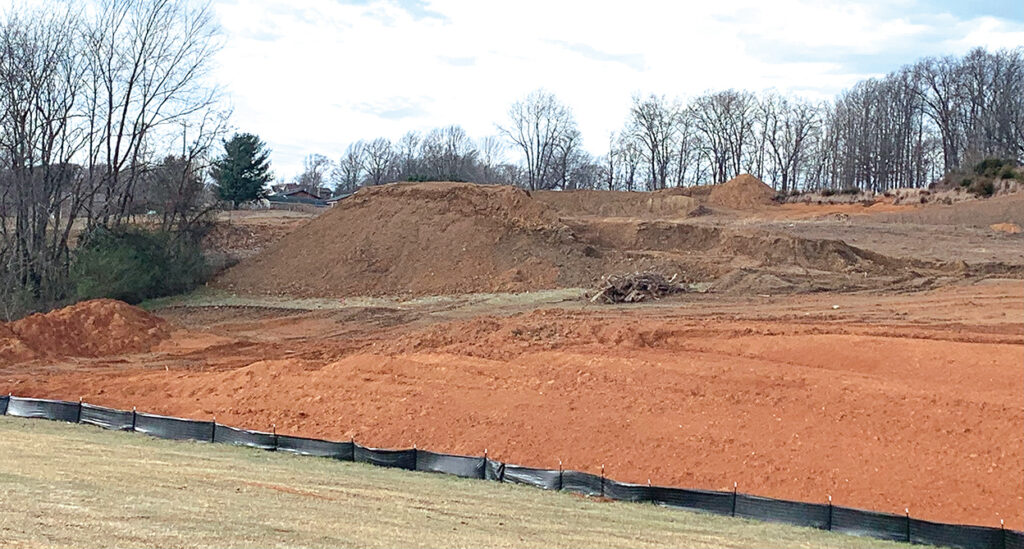
By A.J. Kaufman, Managing Editor
Middlemen have eaten into local farmers’ profits for years, but a new meat processing plant in Washington County should soon change that.
The genesis of recent supply chain delays and meat shortages encouraged a bold idea that continues to blossom into reality. Nearly two years ago, Washington County Commissioners approved $2 million in American Rescue Plan funds for the Appalachian Producers Cooperative (APC) to develop a meat processing plant for local livestock farmers.
In addition to solving logistical pitfalls, there is also a financial component.
Leaders believe the plant coming to Telford is necessary, when most beef in Tennessee is not processed in the Volunteer State. In fact, almost 95% of cattle born in Tennessee are sold as calves at commodity prices to the Midwest. The remaining small percentage are processed at small regional facilities, none of which are located in Washington County.
This dilemma causes farmers to lose out on potential profits, and Tri-Cities consumers are not eating meat raised in their area.
This uneconomical process is susceptible to additional delays causing local livestock owners to often wait 12-18 months for their products to be processed. The new plant is expected to reduce that wait time because, as a farmer-owned cooperative, there will be no middleman, thus reducing costs and enhancing affordability.
Mark Zinnanti became the APC project’s general manager last June. He says he’s known about the idea for years through conversation and had a desire to be part of it.
“My primary reason is that this project will help both farmers/producers and our community,” he explained to the Business Journal. “Producers will have yet an additional outlet to sell their cattle and community members will be able to purchase locally raised and sourced meat products from our wholesale customers. The need for a new local supply chain was highlighted during the pandemic, and we hope to be able to assist in filling the need for our neighbors.”
The APC will locate its operation off Highway 11 E and employ up to 24 people. Currently under construction and expected to be complete this autumn, the plan is to make the processing facility a retail market for people to buy locally raised beef, pork, lamb and goat. Beef processed at the plant will be sold in nearby stores and to restaurants.
Building erection will commence in May, following installation of under slab utilities and pouring of concrete slab. The building itself has been ordered and is expected to be delivered in the coming weeks. The facility is estimated to be approximately 16,000 square feet on nearly 7 acres of land.
With a total project tab nearing $10 million, $2 million comes from Washington County, with the rest coming in grants and bank loans.
Looking back, a half-century ago, most counties encompassed these types of facilities and most food was locally produced, but consolidation changed our reliance to just a few companies who control the majority of the meat processing capacity.
“In today’s meat industry, the majority of products are processed by four primary entities,” Zinnanti said. “Our goal is to bring locally sourced products to our community without the expense of transportation and other overhead costs.”
The APC will be farmer owned, so any middlemen between the people raising cattle and the folks who want to purchase high quality local meat won’t exist.
The new facility has land, infrastructure, and allows the ability to have locally raised beef in our supermarkets. It will not impact traffic in the area or emit odor.
“Our facility will have strict cleaning and sanitary standard operating procedures and inedible materials will be held at refrigerated temperature to minimize spoilage and resultant odor,” Zinnanti added.
The University of Tennessee Extension Office and Tennessee College of Applied Technology (TCAT) are working with Washington County to train and advise farmers, as well as young people, in the field of beef cattle production and butchery.
When beef is grown in East Tennessee and Southwest Virginia, then sold to local consumers, restaurants, and grocery stores, it will be the freshest available, mainly due to no prolonged shipping time across the Appalachian Highlands or storage times required.
That is the prime goal, among many, of the new meat processing plant coming later in 2024 to the Tri-Cities.




